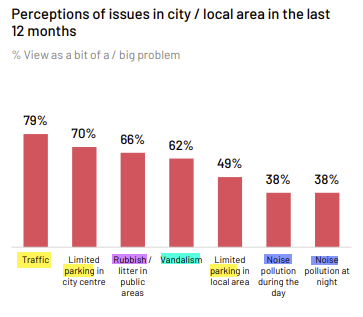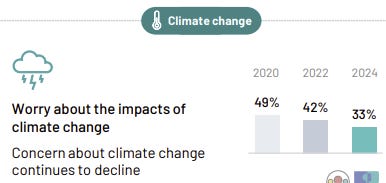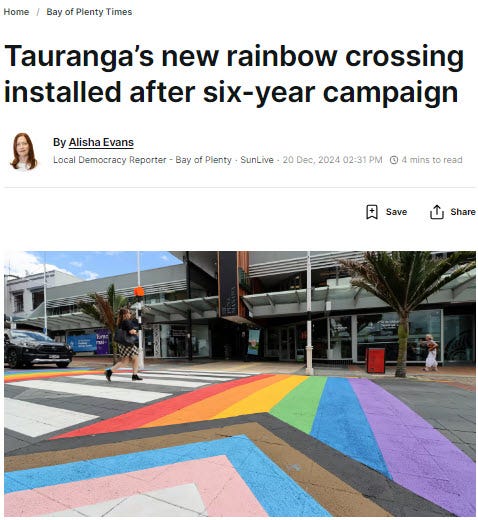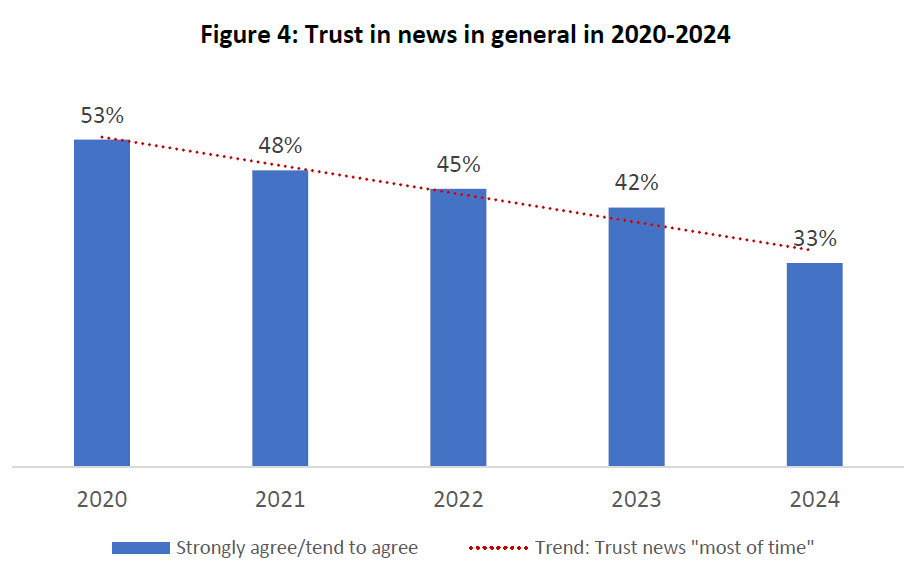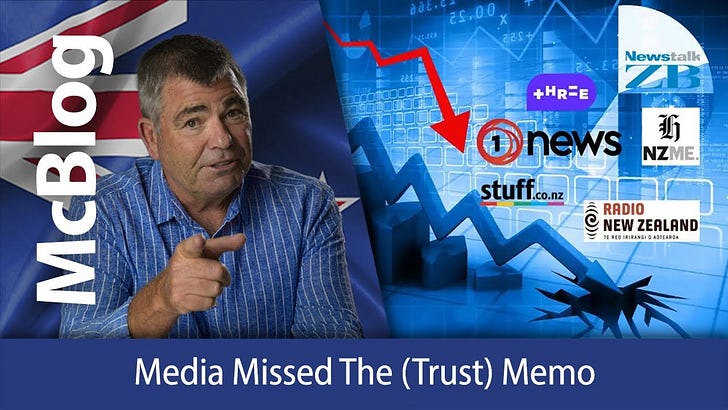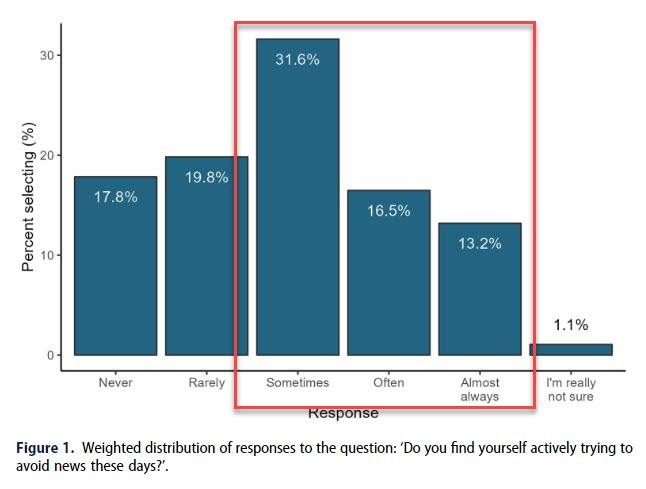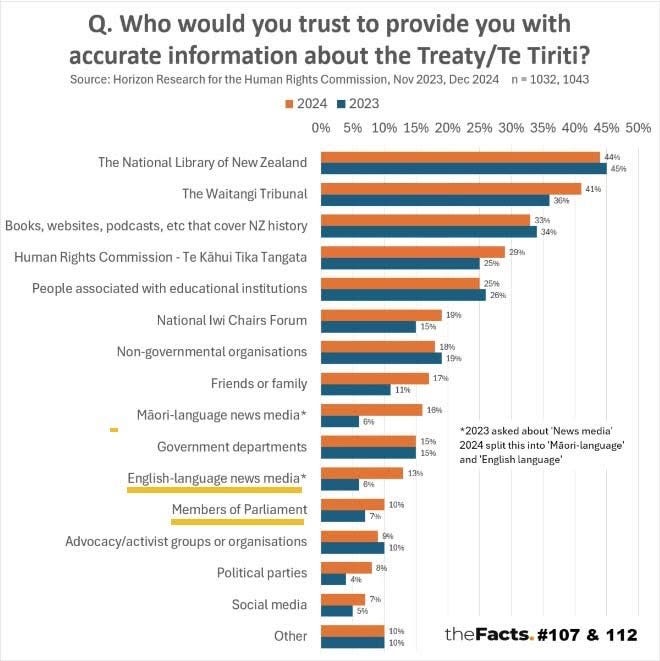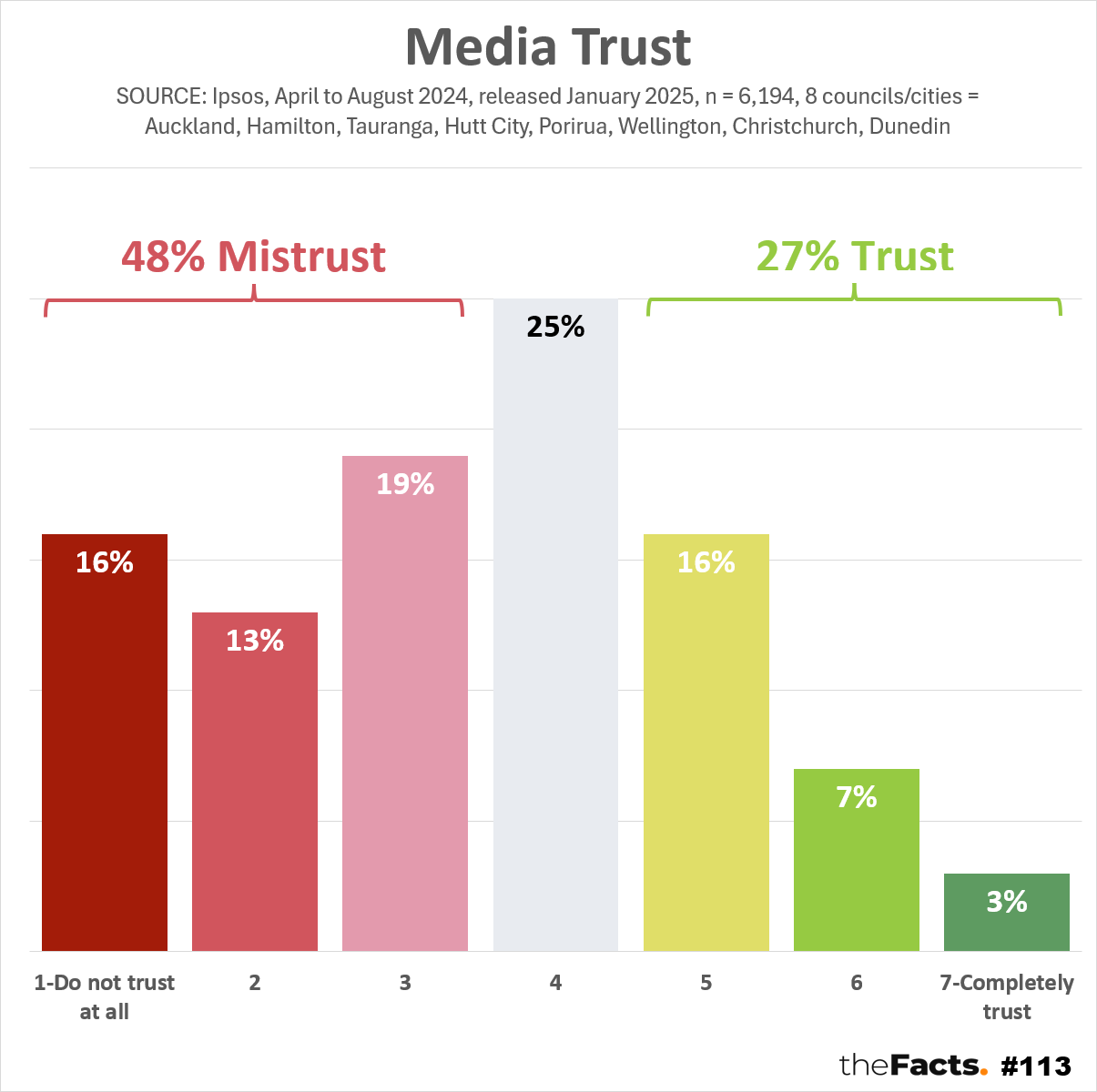Trust in media tanks to a new low
There’s more bad news for the legacy news media which is already suffering a terminal distrust prognosis. A new survey suggests that trust in the news media is sinking to a new low.
There’s more bad news for the legacy news media which is already suffering a terminal distrust prognosis. A new survey suggests that trust in the news media is sinking to a new low.
But the large survey of New Zealanders also suggests that ratepayers are also sick of funding woke things.
So there’s two warnings in this episode – one for the legacy media – and one for Councils pushing leftist views.
The 2024 Quality of Life survey is a collaborative local government research project which is run by Ipsos – a large international polling company.
The primary objective of the survey is to measure residents’ perceptions of aspects of living in larger urban areas. The survey provides data for councils to use as part of their planning.
But it also contributes to public knowledge and research on quality-of-life issues in New Zealand.
The Quality of Life survey was first conducted in 2003, repeated in 2004, and has been undertaken every 2 years since. The number of participating councils has varied each time. Nine councils participated in the 2024 Quality of Life survey – Auckland, Hamilton, Tauranga, Hutt City, Porirua, Wellington, Christchurch, Dunedin, & Waikato Regional Council.
In 2024, a total of just under 7,000 respondents aged 18 years and over completed the Quality of Life survey – so that’s a significant survey.
What is noteworthy is that it doesn’t include a lot of more rural areas in NZ – it’s the major cities – so I would say that this survey would already be slightly left-bias or liberal-bias – which actually makes the results even more astounding.
So let’s have a look at some of the general results before we touch on the trust in media issue.
Firstly, it found that people want their councils to fix Traffic, Parking, Rubbish, Begging/homeless, Anti-social behaviour/vandalism/safety.
These are the core issues, not the woke social engineering stuff like rainbow crossings, PRIDE parades, LGBT flags hanging around streets, DEI meetings for staff, and draq queens story hour in council libraries.
Despite the hysterics of the media and politicians around climate alarmism, the general public aren’t feeling the panic.
In 2020, according to this survey, just under half of us worried about the impacts of climate changes. That is now down to a third. 100% of the media are panicking about climate change, as are the Government and the opposition it seems. But the general public – nope, bigger things to think about.
Maybe the Government should rethink their blind adherence to the ineffectual and unnecessary Paris Accord.
Safety in public was also a big issue for the survey respondents. Around 2 in 3 respondents were concerned about people begging and sleeping on the streets, alcohol & drug problems, and generally feeling unsafe. Half of the respondents were concerned about discrimination and racism. Half weren’t.
So it seems pretty clear. Councils should stick to core business – you know – roads, decent footpaths, sewage, rubbish collection – stuff we pay our rates for.
Let me give you a quick example of how Councils push their own agenda.
You might remember the media celebrating a rainbow crossing being painted in downtown Tauranga.
With all the issues that Tauranga Council could be focusing on, they decided that your sexuality and gender 'identity' is the defining one for ratepayers to be concerned about at the moment.
Tauranga ratepayers - think about that for a moment as you tackle the traffic mayhem around the city and note the shops for lease in Devonport Rd where the crossing is.
According to Official Information Act documents obtained by Family First New Zealand, here's the "feedback" the council got from businesses to waste money on this woke virtue signalling illegal road painting.
Council staff visited approx 67 businesses and asked for feedback. 32 businesses were “in support” (𝐥𝐞𝐬𝐬 𝐭𝐡𝐚𝐧 𝐡𝐚𝐥𝐟!), 17 businesses were “ambivalent” (𝐭𝐡𝐞𝐲 𝐰𝐞𝐫𝐞 𝐦𝐨𝐫𝐞 𝐢𝐧𝐭𝐞𝐫𝐞𝐬𝐭𝐞𝐝 𝐢𝐧 𝐬𝐮𝐫𝐯𝐢𝐯𝐢𝐧𝐠 𝐟𝐢𝐧𝐚𝐧𝐜𝐢𝐚𝐥𝐥𝐲), 6 businesses were “opposed” (𝐠𝐨𝐨𝐝), and 12 businesses had no specific feedback (they probably thought - 𝐰𝐡𝐲 𝐢𝐬 𝐜𝐨𝐮𝐧𝐜𝐢𝐥 𝐞𝐯𝐞𝐧 𝐭𝐚𝐥𝐤𝐢𝐧𝐠 𝐚𝐛𝐨𝐮𝐭 𝐭𝐡𝐢𝐬 𝐫𝐮𝐛𝐛𝐢𝐬𝐡!)
But here’s the key bit. Council staff talked to 𝐰𝐡𝐨𝐞𝐯𝐞𝐫 𝐰𝐚𝐬 𝐢𝐧 𝐭𝐡𝐞 𝐛𝐮𝐬𝐢𝐧𝐞𝐬𝐬 𝐚𝐭 𝐭𝐡𝐞 𝐭𝐢𝐦𝐞 𝐨𝐟 𝐭𝐡𝐞 𝐯𝐢𝐬𝐢𝐭, 𝐚𝐧𝐝 𝐧𝐨𝐭 𝐧𝐞𝐜𝐞𝐬𝐬𝐚𝐫𝐢𝐥𝐲 𝐭𝐡𝐞 𝐛𝐮𝐬𝐢𝐧𝐞𝐬𝐬𝐞𝐬 𝐨𝐰𝐧𝐞𝐫 𝐚𝐧𝐝/𝐨𝐫 𝐥𝐚𝐧𝐝𝐥𝐨𝐫𝐝. Where’s the worker with the blue hair. They’ll say what we want them to say.
An email was sent to 42 businesses. A hard-copy newsletter containing the same text was distributed to city centre businesses at about the same time. Guess how much feedback they got about the rainbow crossing as a direct result of sending all these emails and hard copy newsletters distributed to all businesses in the CBD.
None. Not a single response.
Rainbow crossings are not the priority of normal people who just want to get on with business and make the city a thriving business place.
In a stunning and indepth piece of consultancy by the council, the OIA we received admitted - "𝐎𝐧𝐞 𝐜𝐨𝐮𝐧𝐜𝐢𝐥 𝐬𝐭𝐚𝐟𝐟 𝐦𝐞𝐦𝐛𝐞𝐫 𝐫𝐞𝐩𝐨𝐫𝐭𝐞𝐝 𝐭𝐰𝐨 𝐩𝐨𝐬𝐢𝐭𝐢𝐯𝐞 𝐜𝐨𝐦𝐦𝐞𝐧𝐭𝐬 from business owners on an ad hoc basis from recent discussions on other topics. Both business owners felt that the crossing increased the fun and vibrancy in the city centre and that we are “one community”.
In contrast, a petition with almost 3,000 signatures opposing the $10,000 cost of the crossing was ignored by the councillors
But according to the nzherald.co.nz the crossing has MASSIVE support.
𝑇ℎ𝑒 𝑐𝑜𝑢𝑛𝑐𝑖𝑙 𝑠ℎ𝑎𝑟𝑒𝑑 𝑝ℎ𝑜𝑡𝑜𝑠 𝑜𝑓 𝑡ℎ𝑒 𝑐𝑟𝑜𝑠𝑠𝑖𝑛𝑔 𝑖𝑛 𝑎𝑛 𝐼𝑛𝑠𝑡𝑎𝑔𝑟𝑎𝑚 𝑝𝑜𝑠𝑡 𝑜𝑛 𝑊𝑒𝑑𝑛𝑒𝑠𝑑𝑎𝑦. 𝑇ℎ𝑒 𝑝𝑜𝑠𝑡 𝑠𝑎𝑖𝑑 𝑡ℎ𝑒 𝑐𝑜𝑢𝑛𝑐𝑖𝑙 𝑤𝑎𝑠 “𝑡ℎ𝑟𝑖𝑙𝑙𝑒𝑑 𝑡𝑜 𝑢𝑛𝑣𝑒𝑖𝑙 𝑜𝑢𝑟 𝑏𝑟𝑎𝑛𝑑 𝑛𝑒𝑤 𝑐𝑟𝑜𝑠𝑠𝑖𝑛𝑔, 𝑐𝑒𝑙𝑒𝑏𝑟𝑎𝑡𝑖𝑛𝑔 𝑙𝑜𝑣𝑒, 𝑖𝑛𝑐𝑙𝑢𝑠𝑖𝑣𝑖𝑡𝑦 𝑎𝑛𝑑 𝑑𝑖𝑣𝑒𝑟𝑠𝑖𝑡𝑦 𝑖𝑛 𝑜𝑢𝑟 𝑏𝑒𝑎𝑢𝑡𝑖𝑓𝑢𝑙 𝑐𝑖𝑡𝑦”. 𝐼𝑡 ℎ𝑎𝑠 𝑔𝑎𝑖𝑛𝑒𝑑 134 𝑙𝑖𝑘𝑒𝑠 𝑓𝑟𝑜𝑚 𝑡ℎ𝑒 𝑝𝑎𝑔𝑒’𝑠 1067 𝑓𝑜𝑙𝑙𝑜𝑤𝑒𝑟𝑠.
Impressive.
Unfortunately, Devonport Rd businesses are more interested in surviving than virtue-signalling their sexuality, gender & diversity - AS WE ALL ARE!
So Tauranga Council, Gisborne Council and Auckland Council with their rainbow crossings aren’t listening to ratepayers. It’s time they focused on the basics of good local council governance - traffic, parking, rubbish, sewage, water, & safety issues.
But it’s not only councillors who seem to be deaf.
The media are refusing to listen to the critics also.
Let me just remind you of how bad things had got – before I show you how bad it’s going to get.
At the beginning of last year the fifth report about trust in news in Aotearoa New Zealand was produced by the AUT research centre for Journalism, Media and Democracy (JMAD) in collaboration with the Reuters Institute for the Study of Journalism – a survey of 46 countries.
In 2020, 53% of New Zealanders trusted news in general. In 2024, that figure was at 33%. In five years, general trust in the news has fallen 20 percentage points. Just 1 in 3 NZ’ers trust the news media.
Internationally, we’re competing with the UK and the US for the lowest levels of trust.
Reasons NOT to the trust the news?
Here’s the top 4 and they’ve all increased since last year
The reporting in the news is biased and not balanced
News is too much a result of the political leaning of the newsroom
The news is too opinionated and lacks factual information
There is a lack of transparency in the way the news media operates
And note the 5th one – 61% say Govt financial support for the media in NZ means you cannot trust journalists to hold the government to account.
Approximately 84% of respondents were concerned about fake news. Approximately 92% of respondents were concerned about poor journalism, down from 94% in 2023. “Poor journalism” was defined as making factual mistakes; dumbed-down stories and misleading headlines/clickbait. 92% !!
96% of respondents – almost all of us - were concerned about “stories where facts are spun or twisted to push a particular agenda”,
Wow! Damning.
Last October, a new survey by academics from Victoria University and University of Otago was reported, with an accompanying op-ed by the authors in EveningReport.nz,
They found that 60% of survey participants reported they sometimes, often, or almost always avoid the news. If you add in the “rarely avoid it” 81% avoid it to some extent.
But this total of 60% is higher than any other national figure reported in other studies, with Greece and Bulgaria the next highest at 57%, Argentina at 46%.
Japan has the lowest rates (11%), followed by Taiwan (17%) and Denmark (19%).
The average news avoidance across the 46 countries surveyed by Reuters was 32.6%.
The average. We’re almost double that!
Yes – we have some of the highest rates of news avoidance in the world.
But here’s two more recent examples of just how low our trust in the media has sunk.
This was reported by a very good website http://TheFacts.nz
The Human Rights Commission recently released new (Horizon) research on Treaty trust, and who do we trust and not trust for reliable information on the Treaty of Waitangi and the associated Treaty Principles Bill.
They surveyed at the end of 2023 and then again at the end of last year in the heat of the Treaty Principles Bill being introduced into Parliament and the associated Hikoi.
We get most of our information from politicians and media... but
Only 13% - one three – 13% of us trust English-language news media to provide us with accurate information about the Treaty. It’s 16% for Maori-language news media.
So that means that 87% of us are suspicious of the information we’re receiving from the news media.
Shocking.
Politicians don’t fare better and neither do Government departments. Only 15% of us trust Government departments, 10% MPs, and 8% political parties.
The National Library of NZ, the Waitangi Tribunal, the Human Rights Commission and podcasts and history books on the Treaty are more trusted – but even then none of them are above the 50% trust mark. No organisation is trusted by more than 50% of the population on this issue.
Perhaps that’s why everyone is talking past each other in this current debate.
But 13% trust.
Now that’s on a single issue.
Perhaps we’re all just very suspicious when the legacy news media report on the Treaty issue.
Well, hang on a minute.
Let’s look at our large IPSOS report for the councils which also asked about trust in institutions.
It found strong trust in police, scientists, some trust in education, health & justice.
But low trust in politicians – both local body politicians and Members of Parliament.
But guess who was at the bottom.
Yep you guessed it.
The media.
This is not just distrust on one issue like the Treaty coverage, but in general.
It’s this level of distrust that suggests that the AUT report from last year which shocked everyone with a low level of trust at 33% may actually be far lower this year.
This large and more recent poll shows that just 27% of kiwis have some level of trust for the news media.
Just under half of us (48%) have various levels of distrust – with the remaining 25% sitting on the fence.
It’s the downward trend that should be freaking out our news organisations – but incredibly, they’re just digging down.
What they’re actually doing is digging their own grave. And they’re the only ones who can’t see that.
They refuse to report the news in a balanced way which allows the viewer to come to their own conclusion. Instead they push their own view, bias and narrative – and we can all see it!
33% trust this time last year. Around 15% on the Treaty issues, and 27% trust on a large survey near the end of last year.
The next AUT survey will be out very soon. We’ll let you know as soon as it’s published.
It may well be the obituary for the news media in New Zealand, which is now on life support.


